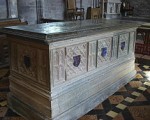
Who’s buried where? How much do you know about the resting places of the Tudors? Test your knowledge with this fun quiz.
[Read More...]
Who’s buried where? How much do you know about the resting places of the Tudors? Test your knowledge with this fun quiz.
[Read More...]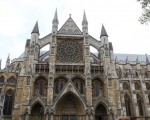
On 20th February 1547, Shrove Sunday, King Edward VI was crowned king at Westminster Abbey.
Chronicler Charles Wriothesley recorded:
“The twentith daie of Februarie, being the Soundaie Quinquagesima, the Kinges Majestie Edward the Sixth, of the age of nyne yeares and three monthes, was crowned King of this realme of Englande, France, and Irelande, within the church of Westminster, with great honor and solemnitie, and a great feast keept that daie in Westminster Hall…..”
[Read More...]
In today’s Claire Chats video I talk about Jane Boleyn, Lady Rochford, her life, her downfall and why Henry VIII had to change the law to execute her.
[Read More...]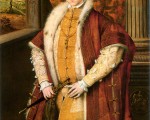
On Saturday 19th February 1547, King Edward VI rode from the Tower of London to Westminter in preparation for his coronation the next day. Chronicler and Windsor Herald Charles Wriothesley recorded:
“The nynetenth daie of Februarie the Kinges Majestie rode from the Towre to Westminster through the cittie of London, which was rychly hanged with riche cloathes and divers pageantes, the conduites running wyne, the craftes standing in their raills, and the aldermen, the lord major riding in a crymosin velvett gowne with a rych collar of goulde, with a mase in his hand, afore the King; and, when his Majestie came where the aldermen stode, the Recorder made a proposition to his Majestie, and after the Chamberlaine gave his Majestie a purse of cloath of gould for a present from the cittie, which he thanckfullie tooke.”
[Read More...]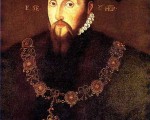
On this day in history, 17th February 1547, Edward Seymour, uncle of King Edward VI and brother of the late Queen Jane Seymour, was made Duke of Somerset. He had already been appointed to the offices of Lord Protector of the Realm and Governor of the King’s Person on 1st February.
[Read More...]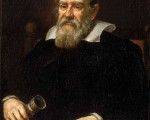
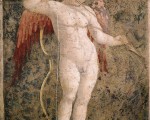
Today is Valentine’s Day, the day of love, so what better than a Valentine quiz?! History and love, a winning combination!
[Read More...]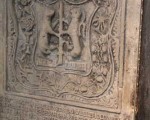
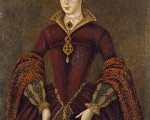
On this day in history, Lady Jane Grey and her husband, Lord Guildford Dudley, were executed for treason.
[Read More...]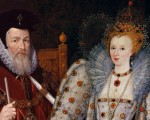
In today’s Claire chats I continue my examination of the fall of Mary, Queen of Scots, by looking at the controversy surrounding the death warrant and examining the Bond of Association and the Act for the Queen’s Safety.
[Read More...]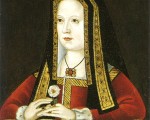
On 11th of February 1466, Elizabeth of York was born at the Palace of Westminster. Exactly thirty seven years later, at the Tower of London, Elizabeth died shortly after giving birth to her last child.
Elizabeth of York was the eldest child of King Edward IV and his wife Queen Elizabeth Woodville. Elizabeth was christened in St Stephen’s Chapel in Westminster Abbey. Jacquetta of Luxembourg, Duchess of Bedford, and Cecily Neville, Duchess of York, stood as her godmothers and Richard Neville, Earl of Warwick, stood as her godfather.
[Read More...]
Just to let you know that this programme is on at 9pm on Wednesday (10th February) on the UK’s BBC Four channel. Here’s the blurb:
“Vanessa Collingridge examines the life of Elizabeth Tudor, with particular interest in how documentary television and the BBC has examined her legacy….”
[Read More...]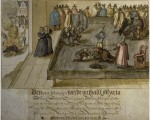
On this day in history, Wednesday 8th February, Mary, Queen of Scots was executed at Fotheringhay Castle, following the arrival of her death warrant at the castle the day before.
Mary had been tried in October 1586 for her involvement in the Babington Plot, a plot to assassinate Queen Elizabeth I, and had been found guilty. Elizabeth I put off signing her death warrant, struggling with the idea of killing an anointed monarch, but finally signed the warrant on 1st February 1587, although Elizabeth claimed later that she ordered her secretary, William Davison, not to do anything with it for the time being. As I mentioned in my article on the death warrant, Elizabeth’s Privy Council met and agreed to send the warrant to Fotheringhay without the Queen’s knowledge. It is impossible to know exactly what happened. Did Davison misunderstand the Queen’s instructions and intentions? Probably not. Some historians believe that William Cecil, Lord Burghley, chose Davison to be a scapegoat because he realised that Elizabeth needed someone to take the responsibility for Mary’s death away from her, but others believe that it was Elizabeth who chose Davison as the scapegoat.
[Read More...]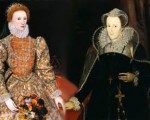
In this week’s Claire Chats I start a two part series on Elizabeth I and the fall of Mary, Queen of Scots. Today, I focus on what led to Mary, Queen of Scots’ execution and next week I will examine the controversy surrounding her death warrant.
[Read More...]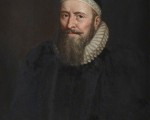
On this day in history, 4th February 1555, John Rogers, clergyman and Biblical editor, was burned at the stake at Smithfield. Rogers was the first England Protestant burned in Mary I’s reign after being condemned as a heretic. he refused the chance of a last minute pardon if he recanted, and died bravely. His wife and eleven children, one being newborn and at the breast, attended his burning. Martyrologist John Foxe recorded that Rogers “constantly and cheerfully took his death with wonderful patience, in the defence and quarrel of the Gospel of Christ.”
[Read More...]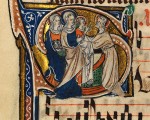
Candlemas, or the the Feast of the Presentation of Christ in the Temple and the Purification of the Blessed Virgin, is celebrated on 2nd February. It commemorates the purification (or churching, as medieval people would have seen it) of the Virgin Mary forty days after the birth of Jesus Christ, when it was traditional for the mother to make an offering or sacrifice according to Jewish law, and the presentation of the baby Jesus at the temple in Bethlehem.
[Read More...]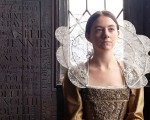
If you’re in the UK or have access to the UK’s BBC2 then make sure that you catch this programme on BBC2 today (1st February 2016) at 9pm. Here’s the blurb from the BBC:
[Read More...]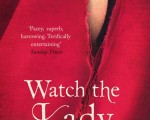
Check out this excerpt from Elizabeth Fremantle’s book “Watch the Lady” and (if it is still February 2016) you can be in with a chance to win a copy!
[Read More...]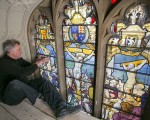
After a huge restoration project, Tudor stained glass windows are being reinstalled at The Vyne in Hampshire, a property that Henry VIII visited several times. In one of the stained glass panels “a slim and beardless young Henry VIII kneels meekly in prayer near his beloved wife Catherine of Aragon and his sister Margaret.”
[Read More...]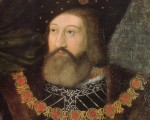
On Candlemas Eve,* 1st February 1514, Henry VIII formally elevated two men to the title of Duke. Charles Brandon, formerly Viscount Lisle, was created Duke of Suffolk, and Thomas Howard, Earl of Surrey, was created 2nd Duke of Norfolk. The ceremony took place at Lambeth and was conducted by the King.
Along with the nearly created Dukes of Suffolk and Norfolk, the only other duke in the Kingdom was Edward Stafford, Duke of Buckingham. Buckingham was a descendent of Thomas Woodstock, youngest son of Edward III. In addition to this, his mother was Katherine Woodville, sister of the late Queen Elizabeth Woodville, wife of King Edward IV. At the time, Buckingham was also the richest peer in England, with an annual income of around £6000 per year (£2,902,620.00) as well as being High Steward of England and a Privy Councillor. These positions gave Stafford a great deal of power. With royal blood running through his veins and an arrogant attitude, Buckingham was a regular member at court but it was reported that he often made those around him feel uncomfortable.
[Read More...]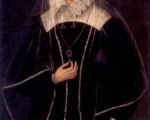
On this day in history, 1st February 1587, Elizabeth I called her secretary, William Davison, to her and asked him to bring her Mary, Queen of Scots’s death warrant. She then signed it.
Mary, Queen of Scots, had been tried in October 1586 for her involvement in the Babington Plot, a plot to assassinate Queen Elizabeth I. As the trial closed, Mary demanded that she should be heard in front of Parliament or the Queen, but she was fighting a losing battle. Sentence was delayed as long as possible, by order of Elizabeth, but on 25th October the commission reconvened and found Mary guilty. On 29th October, Parliament met to discuss Mary, the Babington Plot and her role in Lord Darnley’s murder, and it was decided that they should petition Elizabeth to execute Mary. This put Elizabeth in a difficult position as she did not want to be accused of regicide. On the 4th December, Mary was publicly proclaimed guilty.
[Read More...]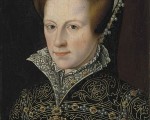
On this day in 1554, Queen Mary I gave a rousing speech at the Guildhall to rally Londoners to her cause and to oppose Wyatt’s rebellion. Contemporary John Proctor recorded that Mary “did wonderfullye inamour the heartes of the hearers as it was a world to heare with what shoutes they exalted the honour and magnanimitie of Quene Mary”.
Mary denounced Thomas Wyatt the Youngerand his rebels, but said that she had sent two of her privy council to “the traitour Wyat, desirous rather to quiete thys tumulte by mercie, then by iustice [justice] of the sworde to vanquishe.” She defended her plan to marry Philip of Spain as being beneficial to England, and affirmed:
[Read More...]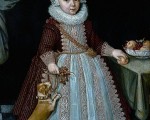
Tudor people were just like us, they loved their animals, but how much do you know about the pets of the Tudors? Test your knowledge with this fun quiz.
[Read More...]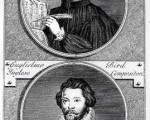
It is thought that Thomas Tallis, alternatively spelled “Tallys,” could have been born on 30 January 1505, though it is not known for certain. What is known is that Tallis did not die until 1585, and that he contributed greatly to the development and composition of English choral music. Not much is known about Tallis’s early life. There are no records of his education or really of his whereabouts until Tallis is well into his 20s. There is also no contemporary portrait of him, with the only existing portrait having been executed sometime after his death.
[Read More...]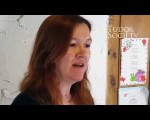
For this week’s Claire Chats I wanted to share with you a video I’ve just made for my “Tudor Cooking with Claire” series. I love ginger and so was interested to find various mentions of “ginger bread” in medieval and Tudor recipe books and to find that it really was ‘gingered bread’.
[Read More...]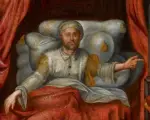
As today is the anniversary of the death of King Henry VIII in 1547, Beth von Staats, Tudor Life magazine contributor and author of Thomas Cranmer in a Nutshell, has written a very moving piece of fiction about Henry VIII’s final days from the viewpoint of Thomas Cranmer. I do hope you enjoy it.
It is time for the Lord to act; they have frustrated Your law. ~~~ Psalm 119:126
[Read More...]